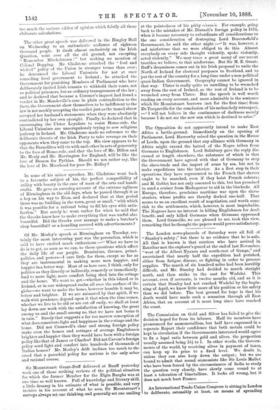Of Mr. Morley's speech at Birmingham on Tuesday, cer- tainly
the most interesting part was the peroration, which is said to have excited much enthusiasm What we have to do is to get, as soon as we can, to those questions which affect the daily life of our people. Dominions, thrones, princi- palities, and powers—I care little for them, except so far as they are instrumental in making more men happier, and happier in a better way. Most of us here care, I think, only for politics as they directly or indirectly, remotely or immediately, lead to more light, more comfort being shed into the cottage and the home. We want to get—whether in this island or in Ireland, or in our widespread realm all over the surface of the globe—we want to make the home, however humble it may be, better and brighter. If we are animated by that spirit, if we walk with prudence, depend upon it that when the time comes, whether we live to be old or are cut off early, we shall at least lay down our work with the satisfaction of knowing, the great among us and the small among us, that we have not borne it in vain." Surely that suggests a far too narrow conception of what does constitute light and happiness in the cottage and the home. Did not Cromwell's clear and strong foreign policy make even the homes and cottages of average Englishmen brighter and happier than they would have been with a foreign policy like that of James or Charles? Did not Cavour's foreign policy send light and comfort into hundreds of thousands of Italian homes ? Mr. Morley's drift inclines too much to the creed that a parochial policy for nations is the only sober and rational course.






































 Previous page
Previous page